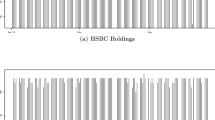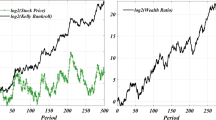Abstract
We investigate the performance of the constantly rebalanced portfolios, when the random vectors of the market process { X i } are independent, and each of them distributed as (X (1), X (2), ..., X (d), 1), d ≥ 1, where X (1), X (2), ..., X (d) are nonnegative iid random variables. Under general conditions we show that the optimal strategy is the uniform: (1/d, ..., 1/d, 0), at least for d large enough. In case of St. Petersburg components we compute the average growth rate and the optimal strategy for d = 1,2. In order to make the problem non-trivial, a commission factor is introduced and tuned to result in zero growth rate on any individual St. Petersburg components. One of the interesting observations made is that a combination of two components of zero growth can result in a strictly positive growth. For d ≥ 3 we prove that the uniform strategy is the best, and we obtain tight asymptotic results for the growth rate.
Preview
Unable to display preview. Download preview PDF.
Similar content being viewed by others
References
Aumann, R.J.: The St. Petersburg paradox: A discussion of some recent comments. Journal of Economic Theory 14, 443–445 (1977)
Bernoulli, D.: Exposition of a new theory on the measurement of risk. Econometrica 22, 22–36 (1954); Originally published in 1738; translated by L. Sommer
Breiman, L.: Optimal gambling systems for favorable games. In: Proc. Fourth Berkeley Symp. Math. Statist. Prob., vol. 1, pp. 65–78. Univ. California Press, Berkeley (1961)
Chow, Y.S., Robbins, H.: On sums of independent random variables with infinite moments and “fair” games. Proc. Nat. Acad. Sci. USA 47, 330–335 (1961)
Csörgő, S., Simons, G.: A strong law of large numbers for trimmed sums, with applications to generalized St. Petersburg games. Statistics and Probability Letters 26, 65–73 (1996)
Feller, W.: Note on the law of large numbers and “fair” games. Ann. Math. Statist. 16, 301–304 (1945)
Haigh, J.: Taking Chances. Oxford University Press, Oxford (1999)
Kelly, J.L.: A new interpretation of information rate. Bell System Technical Journal 35, 917–926 (1956)
Kenneth, A.J.: The use of unbounded utility functions in expected-utility maximization: Response. Quarterly Journal of Economics 88, 136–138 (1974)
Samuelson, P.: The St. Petersburg paradox as a divergent double limit. International Economic Review 1, 31–37 (1960)
Author information
Authors and Affiliations
Editor information
Editors and Affiliations
Rights and permissions
Copyright information
© 2009 Springer-Verlag Berlin Heidelberg
About this paper
Cite this paper
Györfi, L., Kevei, P. (2009). St. Petersburg Portfolio Games. In: Gavaldà, R., Lugosi, G., Zeugmann, T., Zilles, S. (eds) Algorithmic Learning Theory. ALT 2009. Lecture Notes in Computer Science(), vol 5809. Springer, Berlin, Heidelberg. https://doi.org/10.1007/978-3-642-04414-4_11
Download citation
DOI: https://doi.org/10.1007/978-3-642-04414-4_11
Publisher Name: Springer, Berlin, Heidelberg
Print ISBN: 978-3-642-04413-7
Online ISBN: 978-3-642-04414-4
eBook Packages: Computer ScienceComputer Science (R0)




